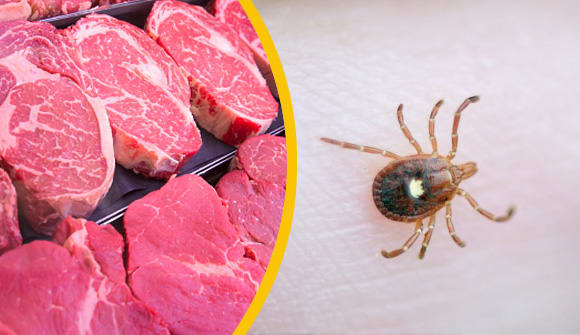Got alpha-gal?
Rise in red meat allergy from ticks.

What’s the first illness that comes to mind when you think of ticks?
While you likely thought of Lyme disease, the Centers for Disease Control and Prevention (CDC) is warning of an – ahem – uptick in cases of a different tick-borne condition: alpha-gal syndrome (AGS).
“Alpha-gal is a sugar molecule found in meat and products made from mammals, but not found in humans,” explained Shalika Katugaha, MD, system director of Infectious Diseases for Baptist Health. “Alpha-gal syndrome is an allergic condition that occurs after people eat red meat or are exposed to something containing alpha-gal.”
Popular products that contain alpha-gal include:
- Beef
- Lamb
- Pork
- Venison
- Gelatin
- Milk products
According to the CDC, as many as 450,000 people in the United States have been affected by AGS.
Transmitted by ticks
So, what do ticks have to do with it?
“Alpha-gal syndrome is primarily associated with the bite of a lone star tick, which is the most common tick that bites humans in Florida,” Dr. Katugaha said. “The tick carries alpha-gal in its saliva because it either produces it or bites mammals that have it. When the tick bites a person, it injects the saliva with alpha-gal. The person’s immune system labels the sugar as foreign and makes antibodies, which react the next time the person is exposed to the sugar in meat weeks to months later.”
Spotting alpha-gal symptoms
According to Dr. Katugaha, symptoms of alpha-gal allergy may not appear until hours after a person eats red meat or dairy. That makes it difficult to draw a connection between the allergic reaction and the trigger food.
Symptoms can vary each time someone eats red meat or dairy and may include:
- Hives or rash
- Nausea, vomiting or indigestion
- Diarrhea
- Stomach pain
- Cough
- Difficulty breathing
- Drop in blood pressure
- Swelling of the lips, eyes, tongue or eyelids
- Dizziness
- Fainting
Though AGS can be lifelong, symptoms may lessen over time with avoidance of triggers and subsequent tick bites.
“With AGS, knowledge is everything. It’s important to increase awareness so health care professionals can make the diagnosis,” said Dr. Katugaha. “Once that happens, the affected person can work with their doctor to make a management plan to avoid foods and triggers. If they stick to the plan, the outlook is good. If the diagnosis is unknown and someone has an allergic reaction, AGS can be serious and potentially life-threatening.”
If you’re experiencing a serious allergic reaction or have other potentially life-threatening symptoms, go to the ER immediately. To find the Baptist or Wolfson Children’s Emergency Center nearest you, click here.



